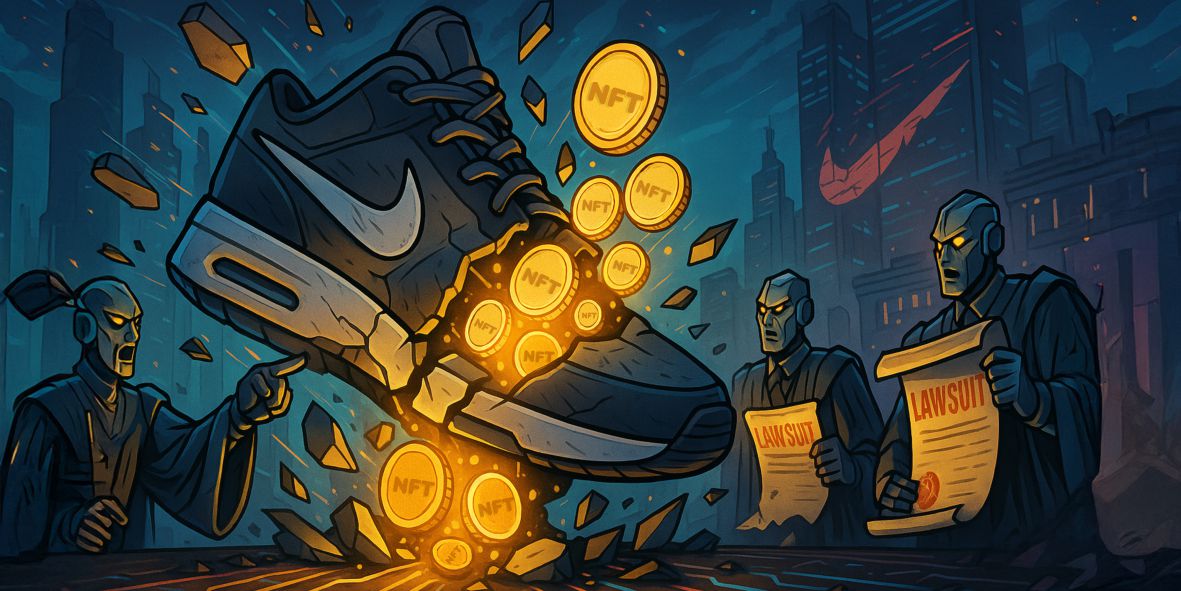Key Takeaways:
- Class Action Claims: Investors allege Nike’s sudden shutdown of RTFKT caused NFT values to plummet, violating consumer protection laws.
- Unregistered Securities: Lawsuit argues Nike NFTs were marketed as investments without Securities and Exchange Commission (SEC) compliance, mirroring crypto “rug pulls.”
- Tech Failures: Cloudflare outage wiped NFT displays days before filing, highlighting centralization risks in Web3 projects.
From Swoosh to Smackdown: Nike’s Web3 Backlash
Nike, the $170B sportswear titan, faces a $5 million class action lawsuit after shuttering RTFKT, its NFT subsidiary acquired in 2021. Investors claim the abrupt December 2024 closure, coupled with broken promises of exclusive rewards and resale profits, turned once-hyped digital collectibles into “worthless JPEGs.” The lawsuit, filed in New York federal court, accuses Nike of leveraging its brand to sell unregistered securities, then executing a “soft rug pull” by abandoning the project.
RTFKT’s flagship Clone X NFTs, designed by artist Takashi Murakami, once traded for over $50,000. Post-shutdown, floor prices crashed 90%, leaving holders like lead plaintiff Jagdeep Cheema with “digital landfill.”
The SEC Shadow Over Branded NFTs
The lawsuit hinges on a critical question: Were RTFKT’s NFTs securities? Plaintiffs argue Nike promoted them as investments, touting future utility like metaverse wearables and token-gated sneaker drops. Such promises, they claim, should have triggered Securities and Exchange Commission (SEC) registration and risk disclosures.
Nike used its marketing might to inflate demand, then walked away. The case lands as the SEC re-evaluates NFT regulation, suggesting some projects may need exemptions.
When Centralization Bites: The Cloudflare Debacle
Days before the lawsuit, RTFKT’s NFTs briefly vanished due to a Cloudflare glitch, exposing reliance on centralized platforms. Images turned to black screens reading, “This content has been restricted”, a stark reminder that many “Web3” projects still depend on Web2 infrastructure.
RTFKT’s tech head Samuel Cardillo blamed an expired contract, later migrating files to Arweave’s decentralized storage. But for investors, the damage was done. The big question is, “How decentralized is a Nike NFT if it disappears when a third-party vendor blinks?”
Brands Beware: Web3’s Trust Crisis
Nike’s legal woes signal a reckoning for corporations diving into NFTs. While brands like Adidas and Gucci continue Web3 experiments, this case sets a precedent: consumers expect longevity, not hype-and-dump tactics.
Summing Up
Nike’s RTFKT saga demonstrates a delicate balance when it comes to branded NFTs, with a thin line between innovation and exploitation. As regulators get involved, the outcome could redefine what it means for a corporation to be accountable in Web3, proving that not all in Web3 is entirely “trustless,” not even for a legacy corporation. Currently, disgruntled holders are left waiting for laurels to explode into something that resembles justice while their digital sneakers sit in a virtual closet collecting binary dust.







